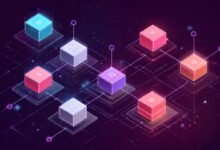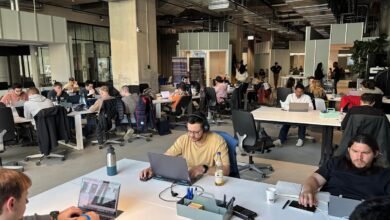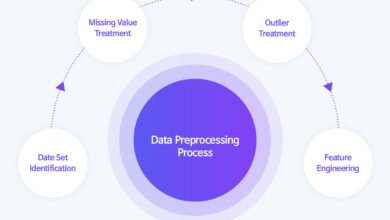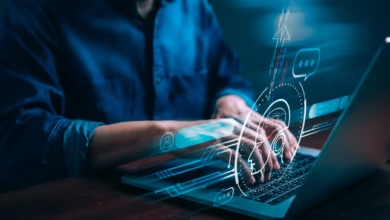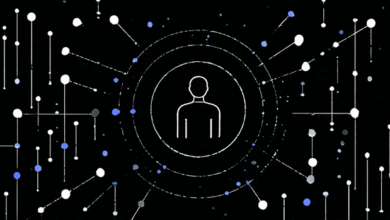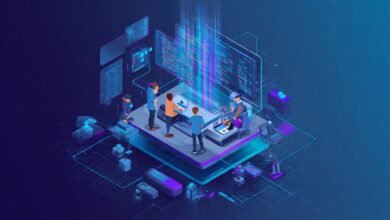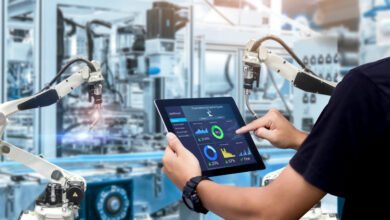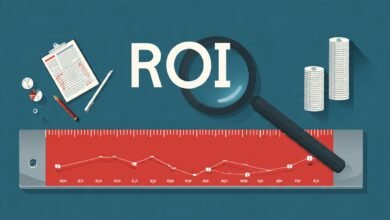How AI and Blockchain are Shaping the Next Digital Era
Discover how AI and blockchain technologies are revolutionizing digital transformation in 2025. Explore industry trends, benefits, and future opportunities shaping the next digital era.
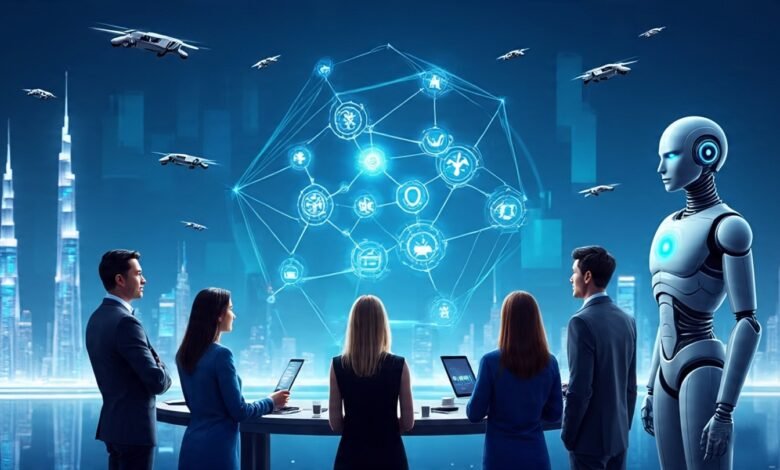
The digital transformation landscape is experiencing an unprecedented revolution as we advance through 2025, with artificial intelligence and blockchain technology emerging as the twin pillars reshaping the global economy. The convergence of AI and blockchain is driving efficiency improvements across sectors like healthcare, finance, and manufacturing, while creating new opportunities for innovation and growth. This powerful synergy is not merely enhancing existing business processes but fundamentally redefining how organizations operate, compete, and deliver value in the next digital era.
The AI blockchain integration represents more than technological advancement—it’s a paradigm shift that promises to democratize data access, enhance security protocols, and create autonomous economic systems. The combined market size of AI and blockchain technologies is projected to exceed $703 million by 2025, witnessing a CAGR of 25.3% from 2020 to 2025. As businesses grapple with increasing digitalization demands, the fusion of these technologies offers solutions to critical challenges including data integrity, operational transparency, and scalable automation.
From smart contracts powered by machine learning algorithms to decentralized AI systems that ensure data privacy while enabling collaborative intelligence, the applications are transforming industries at an unprecedented pace. Organizations are finding that AI and blockchain technology can boost productivity, spur growth, and help create a more just and sustainable society. The implications extend far beyond individual enterprises, promising to reshape supply chains, financial services, healthcare delivery, and even governmental operations through enhanced transparency, security, and efficiency.
Understanding the AI and Blockchain Convergence
The Foundation of Digital Transformation
Artificial intelligence and blockchain technology represent complementary forces in the digital transformation ecosystem. While AI excels at pattern recognition, predictive analytics, and automated decision-making, blockchain provides the secure, transparent infrastructure necessary for trust and verification. The convergence of blockchain and AI brings new value to business through authenticity, augmentation and automation.
This convergence addresses fundamental business challenges that neither technology could solve independently. AI systems often struggle with data integrity and trust issues, while blockchain networks face limitations in scalability and intelligent automation. When combined, these technologies create a synergistic effect that overcomes individual limitations while amplifying collective strengths.
Key Components of AI-Blockchain Integration
The AI blockchain integration operates through several critical components that work together to create intelligent, secure, and transparent systems:
Smart Contract Enhancement: AI-enhanced smart contracts can self-adjust based on market conditions, reducing human intervention and improving efficiency. These contracts can analyze market data, predict trends, and automatically execute predetermined actions without human oversight.
Data Security and Privacy: Blockchain’s immutable ledger combined with AI’s analytical capabilities ensures that sensitive information remains secure while still being useful for business intelligence. This combination is particularly crucial in healthcare, finance, and supply chain management where data integrity is paramount.
Decentralized Intelligence: Blockchain-based decentralized AI systems have potential for tackling some of the most important issues in AI research, such as trust and data privacy. This approach democratizes AI access while maintaining security and privacy standards.
Industry Applications and Real-World Impact
Healthcare and Life Sciences
The healthcare sector is experiencing revolutionary changes through AI blockchain applications. In the life sciences industry, AI in blockchain is set to transform data management and drug development by ensuring the integrity of clinical trial data while AI can sift through large datasets to identify trends and speed up the drug discovery process.
Healthcare organizations are implementing blockchain-secured patient records that AI systems can analyze while maintaining privacy. This combination enables personalized treatment recommendations, drug interaction predictions, and population health insights without compromising patient confidentiality. The technology also streamlines regulatory compliance and improves pharmaceutical traceability, ultimately enhancing patient safety and outcomes.
Financial Services Revolution
Digital transformation in financial services is being accelerated by AI-blockchain integration. AI and blockchain are transforming the financial services industry by enabling trust, removing friction from multiparty transactions and accelerating the speed of transactions. Modern financial institutions are leveraging this combination for automated loan processing, fraud detection, and risk assessment.
The integration enables real-time fraud prevention through AI-powered analysis of blockchain-stored transaction data. Smart contracts automatically execute financial agreements based on AI-generated market insights, reducing processing time from days to minutes. This transformation is particularly evident in decentralized finance (DeFi) platforms where AI algorithms manage investment portfolios while blockchain ensures transparent and secure transactions.
Supply Chain Optimization
By digitizing a largely paper-based process, making the data shareable and trustworthy, and adding intelligence and automation to execute transactions, AI and blockchain are transforming supply chains across industries and creating new opportunities. Modern supply chains require transparency, traceability, and predictive capabilities that traditional systems cannot provide.
AI algorithms analyze blockchain-stored supply chain data to optimize logistics, predict demand patterns, and identify potential disruptions before they occur. AI can analyze blockchain-stored data to optimize logistics, detect inefficiencies, and predict demand trends. This combination enables companies to reduce waste, improve efficiency, and respond quickly to market changes while maintaining complete visibility across their supply networks.
Emerging Trends in the Next Digital Era
Autonomous Economic Systems
The next digital era is characterized by the emergence of autonomous economic systems powered by AI blockchain integration. Autonomous agents (i.e., sensors, cars, machines, trucks, cameras, and other IoT devices) will in the future act as own profit centers that have a digital twin leveraging IoT, send and receive money leveraging blockchain technology on their own, and autonomously make decisions as independent economic agents leveraging AI and data analytics.
These systems represent a fundamental shift from traditional business models to automated, intelligent networks that can operate independently. Vehicles can negotiate parking fees, manufacturing equipment can order supplies, and smart buildings can optimize energy consumption—all without human intervention. This level of automation promises unprecedented efficiency gains while reducing operational costs.
Cross-Chain Interoperability
Blockchain technology is evolving beyond single-network limitations through AI-enhanced cross-chain solutions. Cross-chain technology developments in 2025 will simplify asset transfers between various blockchain platforms and encourage collaboration within blockchain ecosystems. AI algorithms optimize transaction routing across different networks, ensuring optimal performance and cost efficiency.
This interoperability is crucial for enterprise adoption, as organizations can leverage multiple blockchain networks while maintaining seamless operations. AI systems automatically select the most appropriate blockchain for specific transactions based on factors like speed, cost, and security requirements.
Sustainable Technology Integration
The digital transformation movement is increasingly focused on sustainability, with AI and blockchain playing crucial roles in environmental responsibility. The focus is on sustainable blockchain solutions that reduce carbon footprints without compromising security. AI algorithms optimize energy consumption in blockchain networks while maintaining security and performance standards.
Green computing initiatives are leveraging AI to minimize the environmental impact of blockchain operations. Smart energy management systems use AI to predict and optimize power consumption patterns while blockchain technology enables transparent carbon credit trading and environmental impact tracking.
Benefits and Opportunities
Enhanced Security and Trust
The combination of AI and blockchain creates unprecedented security advantages. Blockchain’s digital record offers insight into the framework behind AI and the provenance of the data that it is using, addressing the challenge of explainable AI. This transparency improves trust in AI-driven decisions while blockchain’s immutable nature ensures data integrity.
AI systems continuously monitor blockchain networks for suspicious activities, providing real-time threat detection and response. The decentralized nature of blockchain combined with AI’s analytical capabilities creates a robust defense against cyber threats, data breaches, and fraudulent activities.
Operational Efficiency Gains
Organizations implementing AI blockchain integration report significant operational improvements. The automation of routine processes, intelligent contract execution, and predictive maintenance capabilities reduce manual intervention while improving accuracy and speed. Organizations that effectively integrate AI, blockchain, automation, and analytics into their operations see measurable improvements in quality, efficiency, and client satisfaction.
These efficiency gains translate directly into competitive advantages, allowing organizations to respond more quickly to market opportunities, reduce operational costs, and improve customer experiences. The combination enables real-time decision-making based on comprehensive data analysis while maintaining security and compliance standards.
Innovation and Business Model Transformation
The next digital era is characterized by entirely new business models enabled by AI-blockchain convergence. The convergence of blockchain, IoT, and AI marks a turning point in digital transformation, promising to create a digital operating system capable of reshaping industries and economies by 2030.
Organizations are developing innovative services that were previously impossible, such as micro-transaction platforms for IoT devices, AI-driven investment funds with blockchain transparency, and automated supply chain networks that optimize themselves continuously. These new models create value through increased efficiency, reduced friction, and enhanced trust between parties.
Challenges and Considerations
Technical Implementation Hurdles
Despite the promising potential, AI blockchain integration faces several technical challenges. Current blockchain networks, particularly those using proof-of-work mechanisms, face limitations in transaction speed and throughput that can hinder real-time AI applications. Organizations must carefully balance performance requirements with security considerations when implementing these technologies.
Scalability remains a primary concern as AI applications require high-frequency data processing while blockchain networks have inherent throughput limitations. Solutions include layer-2 scaling technologies, alternative consensus mechanisms, and hybrid architectures that optimize performance without sacrificing security.
Regulatory and Compliance Issues
The regulatory landscape for AI and blockchain technology continues to evolve, creating uncertainty for organizations planning implementations. Challenges include ethical concerns, regulations, and skill gaps that organizations must address to ensure successful deployment.
Compliance requirements vary significantly across jurisdictions, making global implementations complex. Organizations must stay informed about regulatory developments while building flexible systems that can adapt to changing requirements without compromising functionality.
Skills and Talent Gap
The digital transformation enabled by AI-blockchain integration requires specialized skills that are currently in short supply. Organizations need professionals who understand both technologies and can design integrated solutions that maximize their combined potential. Investment in training and talent development is crucial for successful implementation.
The complexity of these technologies requires cross-functional teams with expertise in AI algorithms, blockchain architecture, cybersecurity, and business process optimization. Organizations must develop comprehensive training programs and partnership strategies to address these skill requirements.
Future Outlook and Predictions
Technology Evolution Trends
The next digital era will be shaped by continued evolution in both artificial intelligence and blockchain technology. By 2030, we’re expecting over 30 billion IoT devices worldwide, with AI systems capitalizing on massive amounts of data to provide actionable insights. This proliferation of connected devices will create new opportunities for AI-blockchain integration across industries.
Quantum computing integration promises to enhance both AI processing capabilities and blockchain security. Advanced AI models will become more sophisticated while blockchain networks will achieve higher scalability through quantum-resistant cryptography and quantum-enhanced consensus mechanisms.
Market Growth Projections
The market for AI blockchain integration is expected to experience explosive growth in the coming years. Industry analysts predict that the combination of digital transformation drivers, regulatory clarity, and technological maturity will accelerate adoption across sectors. Enterprise blockchain adoption is accelerating, driven by the tokenization of real-world assets projected to reach $600 billion by 2030.
Investment in AI-blockchain solutions will continue to increase as organizations recognize the competitive advantages these technologies provide. The focus will shift from experimental implementations to production-ready solutions that deliver measurable business value.
Industry Transformation Predictions
The digital transformation enabled by AI-blockchain convergence will fundamentally reshape entire industries. Traditional business models will give way to platform-based, automated systems that operate with minimal human intervention. If we can link billions of devices to blockchain and AI through secure infrastructure, we unlock the potential of a truly interconnected digital economy.
Healthcare will see personalized treatment protocols managed by AI with blockchain-secured patient data. Financial services will become fully automated with AI-driven investment strategies and blockchain-based settlements. Supply chains will operate as self-optimizing networks that respond to real-time market conditions automatically.
Conclusion
The convergence of AI and blockchain technologies is fundamentally reshaping the digital transformation landscape, creating unprecedented opportunities for innovation, efficiency, and growth in the next digital era. From healthcare and finance to supply chain management and energy systems, this powerful combination is solving complex challenges while enabling entirely new business models. Organizations that embrace this transformative combination will not only enhance their operations but also drive innovation that benefits society as a whole. As we advance through 2025 and beyond, the organizations that successfully integrate these technologies will lead the charge in creating a more secure, efficient, and interconnected digital economy. The future belongs to those who can harness the synergistic potential of artificial intelligence and blockchain technology to transform not just their operations, but entire industries and economic systems.
